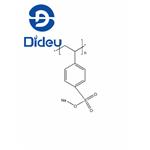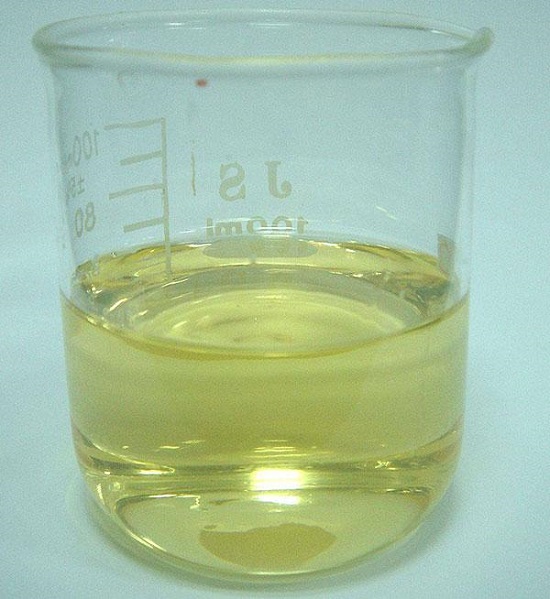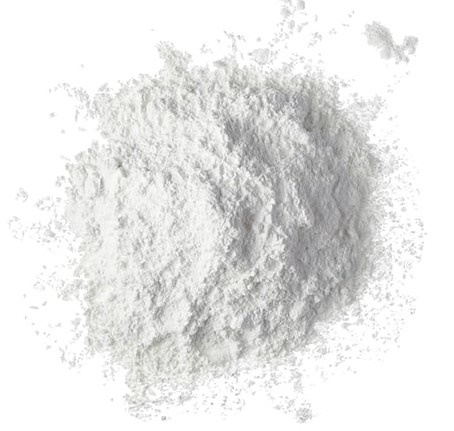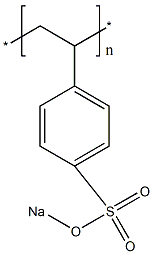The Water-soluble compound: Poly(sodium 4-styrenesulfonate)
Oct 24,2023
Description
Poly(sodium 4-styrenesulfonate) is also known as Polystyrene sulfonate, PSSNa, or sodium PSS. As a polystyrene sulfonate, it was developed in the 2000s to treat Clostridium difficile-associated diarrhea under the name Tolevamer, but it was never marketed. This compound is low-cost, dissolves quickly in water at room temperature, and has good compatibility with most organic material processing techniques. Hence, it is widely used in laboratory research and industrial production.
Chemical Properties
Poly(sodium 4-styrenesulfonate) is an organic polymer with the chemical formula [C8H7SO3−] n. It is a white-to-tan powder. At 25 °C, it has a density of 1.163 g/ml. It has a Melting point of 460 °C and a Boiling point of 100 °C. Its good water solubility is an advantage that cannot be ignored in many applications[1].
Uses
The Water-soluble compound can be used as a negative electron beam resist developed in water. Electron beam lithography (EBL) is one of the currently most widely employed nanolithography techniques. In addition, EBL is also undoubtedly the most popular for R&D. Sensitivity and contrast are the two primary resist properties. High sensitivity leads to short exposure time, whereas high contrast enables high-resolution patterning of dense structures. Specifically, Poly(sodium 4-styrenesulfonate) as a negative electron beam resist has two advantages::Sodium PSS is a very stable and low-cost resist with a rather straightforward lithography process, though sodium is not as resistant to dry etching as many other metals[2]. For the second aspect, due to its ionic nature, sodium PSS can be dissolved and developed using water, rather than a solvent that may pose health or environmental problems. In addition, when the reduced metal agglomerates form nanoparticles, sodium PSS the metal sodium is homogenously distributed in the exposed film.

Antiviral properties of PSSNa have been previously reported in studies on both human and animal pathogenic viruses. This substance could used as a new polymeric ZIKV inhibitor[3]. Zika virus (ZIKV) belongs to the Flaviviridae family and the ZIKV is a mosquito-borne arbovirus, for which Aedes mosquitoes are competent vectors. Studies on the mechanism of action revealed that poly(sodium 4-styrenesulfonate) (PSSNa) can efficiently hamper ZIKV infection in vitro by directly binding to the virus and preventing the attachment of the virus to the host cell. PSSNa vastly decreases the viral replication in vitro in several cellular models, indicating broad specificity regardless of the model. what's more, PSSNa can effectively treat ongoing infections, without loss in antiviral activity over time, as indicated in Assay IV. These properties make the substance very promising as an antiviral agent.
Conclusions
What we can't ignore is that Poly(sodium 4-styrenesulfonate) is commonly used as a dispersing agent. Based on the above discussion, we can find that Poly(sodium 4-styrenesulfonate) is a substance with wide application prospects, and we believe that Poly(sodium 4-styrenesulfonate) with good performance can bring more surprises to scientific development.
References
[1]Ji D, et al. Poly(sodium-4-styrene sulfonate) (PSSNa)-assisted transferable flexible, top-contact high-resolution free-standing organic field-effect transistors.RSC Advances, 2015; 5: 98288-98292.
[2] Abbas A, et al. Water soluble and metal-containing electron beam resist poly(sodium 4-styrenesulfonate). Materials Research Express, 2014.
[3]Botwina P, et al. In Vitro Inhibition of Zika Virus Replication with Poly(Sodium 4-Styrenesulfonate). Viruses, 2020; 12: 926.
- Related articles
- Related Qustion
- Poly(sodium 4-styrenesulfonate): A Versatile Polymer Transforming Dental, Membrane, and Energy Storage Technologies Feb 19, 2024
Poly(sodium 4-styrenesulfonate) enhances dental implants, ion exchange membranes, and supercapacitors, demonstrating its versatile technological applications and functional improvements.
- Poly(sodium-p-styrenesulfonate): applications and safety Nov 3, 2023
Poly(sodium-p-styrenesulfonate) has various applications, but proper handling is crucial for safety.
- Poly(sodium 4-styrenesulfonate) & Biodegradable materials Oct 25, 2023
Biodegradable polymers are widely used in biological applications. However, the performance of biodegradable materials needs to be improved.
The major application of 4-methyl-2- pentanone is as a solvent for vinyl, epoxy, and acrylic resins, for natural resins, and for nitrocellulose. A further use is as a solvent for dyes in the printing industry.....
Oct 23,2023Organic reagentsSodium allylsulfonate is widely used in pharmaceutical, plating, and paint formulating industries.....
Oct 24,2023SurfactantPoly(sodium 4-styrenesulfonate)
25704-18-1You may like
Poly(sodium 4-styrenesulfonate) manufacturers
- Poly(sodium-p-styrenesulfonate)
-

- $0.00 / 1KG
- 2025-12-12
- CAS:25704-18-1
- Min. Order: 1KG
- Purity: 98%min
- Supply Ability: 30tons/month
- Poly(sodium-p-styrenesulfonate)
-

- $10.00 / 1KG
- 2025-12-11
- CAS:25704-18-1
- Min. Order: 100KG
- Purity: 99%
- Supply Ability: 100 mt
- Poly(sodium 4-styrenesulfonate)
-

- $0.00 / 25kg
- 2025-12-01
- CAS:25704-18-1
- Min. Order: 1kg
- Purity: 99%
- Supply Ability: 10000KGS






